|
|
|
ADVERTISEMENTS
|
|
PREMIUM
- HAPPY HOLIDAYS!
- Siliconeer Mobile App - Download Now
- Siliconeer - Multimedia Magazine - email-Subscription
- Avex Funding: Home Loans
- Comcast Xfinity Triple Play Voice - Internet - TV
- AKSHAY PATRA - Bay Area Event - Sat. Dec 6
- Calcoast Mortgage - Home Loans
- New Homes in Silicon Valley: City Ventures - Loden Place - Morgan Hill
- Bombay to Goa Restaurant, Sunnyvale
- Buying, Sellling Real Estate in Fremont, SF Bay Area, CA - Happy Living 4U - Realtor Ashok K. Gupta & Vijay Shah
- Sunnyvale Hindu Temple: December Events
- ARYA Global Cuisine, Cupertino - New Year's Eve Party - Belly Dancing and more
- Bhindi Jewellers - ROLEX
- Dadi Pariwar USA Foundation - Chappan Bhog - Sunnyvale Temple - Nov 16, 2014 - 1 PM
- India Chaat Cuisine, Sunnyvale
- Matrix Insurance Agency: Obamacare - New Healthcare Insurance Policies, Visitors Insurance and more
- New India Bazar: Groceries: Special Sale
- The Chugh Firm - Attorneys and CPAs
- California Temple Schedules
- Christ Church of India - Mela - Bharath to the Bay
- Taste of India - Fremont
- MILAN Indian Cuisine & Milan Sweet Center, Milpitas
- Shiva's Restaurant, Mountain View
- Indian Holiday Options: Vacation in India
- Sakoon Restaurant, Mountain View
- Bombay Garden Restaurants, SF Bay Area
- Law Offices of Mahesh Bajoria - Labor Law
- Sri Venkatesh Bhavan - Pleasanton - South Indian Food
- Alam Accountancy Corporation - Business & Tax Services
- Chaat Paradise, Mountain View & Fremont
- Chaat House, Fremont & Sunnyvale
- Balaji Temple - December Events
- God's Love
- Kids Castle, Newark Fremont: NEW COUPONS
- Pani Puri Company, Santa Clara
- Pandit Parashar (Astrologer)
- Acharya Krishna Kumar Pandey
- Astrologer Mahendra Swamy
- Raj Palace, San Jose: Six Dollars - 10 Samosas
CLASSIFIEDS
MULTIMEDIA VIDEO
|
|
|
|
|
NEWS DIARY | JANUARY 2010
I Will Not Go, Says Climate Chief After Report Error | Doubts Expressed over India's 'Miracle' Biofuel Crop | Lanka President Leads | Profit Increases | Taliban Ready to Talk? | New Highway | Execution Upheld | ISRO Test
I Will Not Go, Says Climate Chief After Report Error
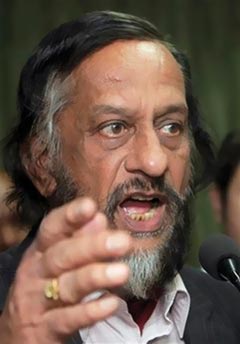 Rajendra Pachauri Rajendra Pachauri
The chairman of the UN's climate science body said he would not resign in the wake of a row about a mistake on glaciers that appeared in a key report.
Rajendra Pachauri told BBC News: "I am not going to stand down, I am going to stand up."
The Intergovernmental Panel on Climate Change (IPCC) admitted that it had made a mistake in asserting that Himalayan glaciers could disappear by 2035. Critics say the mistake has damaged the scientific credibility of the IPCC.
"I was re-elected by acclamation, essentially - I imagine - because everyone was satisfied with my performance on the fourth assessment report," Dr Pachauri said. "I am now charged with producing the fifth assessment report, which I will do faithfully and to the best of my abilities."
Earlier, IPCC vice-chairman Jean-Pascal van Ypersele admitted that the inclusion of the 2035 date in a key report was a mistake. The date appeared in the IPCC's Fourth Assessment Report, which read: "Glaciers in the Himalayas are receding faster than in any other part of the world... the likelihood of them disappearing by the year 2035 and perhaps sooner is very high."
A number of scientists had recently disputed the date, after a row erupted in India late last year in the run-up to the Copenhagen climate summit.
Dr Pachauri said the inclusion of the 2035 date in the 4AR, which was published in 2007, was "a case of human error."
"However, let me emphasize that this does not in any way detract from the fact that the glaciers are melting, and this is a problem that we need to be deeply concerned about."
|TOP|
Doubts Expressed over India's 'Miracle' Biofuel Crop
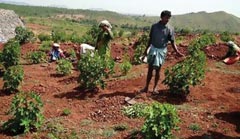 Laborers working in a jatropha field in Hassan, Karnataka Laborers working in a jatropha field in Hassan, Karnataka
To its fans, jatropha is a miracle crop, an eco-friendly answer to India's growing energy needs, but some experts are starting to question whether the wonder-shrub is too good to be true.
The seeds of the wild plant, which grows abundantly across India, produce non-edible oil that can be blended with diesel, to make the biofuel that is part of government efforts to cut carbon emissions and combat climate change.
That, combined with the shrub's much vaunted ability to flourish on poorly irrigated land, should make it the perfect crop for wasteland in the drought-prone nation.
But new research shows jatropha, which has received huge government backing in recent years, yields less than experts had first predicted and is now being grown on fertile farmland — undermining two of its best selling points.
"Jatropha is being talked of as a crop that will grow on marginal and uncultivated land, and which will not compete with mainstream cultivation," said Sharachchandra Lele, a senior fellow at ATREE, an Indian environmental research group promoting sustainable development.
"But this is not what is happening in practice. Some state governments are promoting its cultivation on regular agricultural land, where it will displace existing crops, including food crops," said Lele.
"We are basically subsidizing the urban elite's petrol consumption at the cost of rural livelihoods and food production."
The Indian government has aggressively promoted production of the crop, setting its sights on 27 million acres of plantations nationwide by next year.
|TOP|
Lanka President Leads
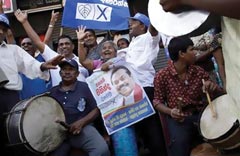 Supporters of Sri Lankan President Mahinda Rajapksa cheer in Colombo. Supporters of Sri Lankan President Mahinda Rajapksa cheer in Colombo.
Early returns showed Sri Lanka's incumbent president ahead of his former army chief in their bitter race to win the country's first postwar election, while government troops surrounded the ex-general's hotel in a sign of sky-high tensions.
The former allies, President Mahinda Rajapaksa and his challenger Sarath Fonseka, both are considered heroes by the country's Sinhalese majority for their leading role in defeating the Tamil Tigers in their quarter-century fight for an independent Tamil state.
But their presidential election contest has been acrimonious from the start, with the general accusing his former boss of entrenched corruption and the president branding Fonseka a dictator-in-waiting.
Initial results showed Rajapaksa leading with 1,125,297 votes compared to 752,850 for Fonseka. But the race was still up for grabs, with millions of votes not tallied. There are some 14 million registered voters, and the overall turnout during polling was around 70 percent.
Meanwhile, troops surrounded the Cinnamon Lake hotel after about 400 people, including alleged army deserters, had gathered inside along with Fonseka, military spokesman Brig. Udaya Nanayakkara said.
"We don't know what's their motive and as a protective measure, we have deployed troops around the hotel and people who go in and come out are being checked," Nanayakkara told The Associated Press. He said that there were no plans to arrest Fonseka.
Jehan Perera, a political analyst in Colombo, called the military's move "absolutely unprecedented."
"It reflects the suspicion and the level of mistrust," Perera said.
Attempts to reach Fonseka at the hotel were not immediately successful.
|TOP|
Profit Increases
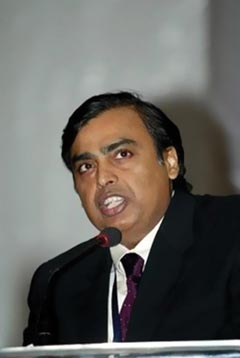 Mukesh Ambani Mukesh Ambani
Indian energy giant Reliance Industries has said that its net profits jumped in the last three months of 2009. Profits at the firm — India's largest by market capitalization — rose by 15.8 percent to 40.1 billion rupees ($861 million). Revenue at Reliance almost doubled to 588.5 billion rupees, pushed up by rising oil prices.
Exports also nearly doubled, to 351.5 billion rupees. Shares in the company — controlled by India's richest man Mukesh Ambani — rose 1.5 percent to 1,069 rupees.
Ambani is locked in a high-profile argument with his brother, Anil Ambani, who runs Reliance Natural Resources. The siblings disagreed over the price at which Mukesh Ambani's Reliance Industries was selling gas to Anil Ambani's Reliance Infrastructure.
|TOP|
Taliban Ready to Talk?
The U.S. must negotiate a political settlement to the Afghanistan war directly with Afghan Taliban leader Mullah Mohammad Omar because any bid to split the insurgency through defections will fail, said the Pakistani former intelligence officer who trained the insurgent chief.
Omar is open to such talks, asserted retired Brigadier Sultan Amir Tarar, a former operative of Pakistan's premier spy agency, the Inter-Services Intelligence Directorate.
"If a sincere message comes from the Americans, these people (the Taliban ) are very big-hearted. They will listen. But if you try to divide the Taliban , you'll fail. Anyone who leaves Mullah Omar is no more Taliban . Such people are just trying to deceive," said Tarar in an interview with McClatchy.
His comments came as the U.S. and its NATO allies appear increasingly anxious to find a path toward a political resolution to the more than eight-year-old war whose escalating human and financial costs are fueling growing popular opposition.
In Washington , U.S. National Security Adviser James Jones was asked by McClatchy if the Obama administration ruled out having the ISI act as a conduit between Omar and the U.S., as Pakistani officials are advocating.
Senior U.S. and European officials have in recent days been heavily promoting a "re-integration" plan under which low-level Taliban fighters are to be offered jobs, education and protection in return for renouncing al Qaida and defecting to the Afghan government.
Afghan President Hamid Karzai is being encouraged to reach out to senior Taliban leaders, who U.S. commanders think may be induced to switch sides under the pressure of a stepped up military campaign by the 116,000-strong U.S.-led international force bolstered by 30,000 more American soldiers, most of who are due to arrive this summer.
|TOP|
New Highway
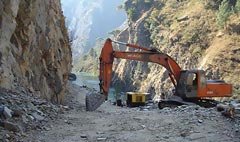 The Himalayan mountains on the Nepal-China border are some of the most remote and inaccessible in the world. The Himalayan mountains on the Nepal-China border are some of the most remote and inaccessible in the world.
But deep in the valleys next to the Kyirong River, Chinese construction workers are blasting through the jagged landscape to turn an ancient trading track into a modern road.
This small stretch of road — just 10.5 miles — from the border to the Nepalese town of Syabrubesi is costing the Beijing government almost $20 million.
But it's an important investment because this mountain pass not only connects Tibet to Nepal — - it's also the most direct land route to India's capital, Delhi.
"There is an old Chinese saying, 'To get rich, build roads first'," says the Chinese team's engineer Zhang Peng.
"When this road is ready, living standards and the economy around here will improve," he says.
"Nepalese people will be able to visit Lhasa, in Tibet, and other parts of China, and Chinese tourists and businessmen will come here."
The road will make a huge difference to communities on both sides of the border.
Traders still walk the old path that runs alongside the new road — an ancient thoroughfare across the roof of the world that connects Nepal to the historic Silk route.
Thirty-five-year old Mingma Dorje Ghale has walked this small, rocky path since he was a child.
He and his friend have just trekked back from Tibet, a day's walk away, carrying bottles of Chinese brandy on their backs.
They plan to sell their goods in Nepal's border towns.
"When this road is built, I won't have to carry this heavy backpack up and down," he says.
His friend's five-year-old daughter leads their yak.
|TOP|
Execution Upheld
 A flower wreath is seen at the former residence of Bangladesh’s founding president Sheikh Mujibur Rahman in Dhaka. Bangladesh's Supreme Court confirmed the death sentence for the five convicted killers of Sheikh Mujibur Rahman, setting the stage for their execution. A flower wreath is seen at the former residence of Bangladesh’s founding president Sheikh Mujibur Rahman in Dhaka. Bangladesh's Supreme Court confirmed the death sentence for the five convicted killers of Sheikh Mujibur Rahman, setting the stage for their execution.
Bangladesh's Supreme Court has confirmed the death sentence for five convicted killers of the nation's founding president Sheikh Mujibur Rahman, setting the stage for their execution.
The court dismissed the men's final attempt to challenge their sentences for assassinating Mujib in 1975.
"The Supreme Court, headed by the country's chief justice, has dismissed their final appeals," Syed Anisul Haque, chief counsel for the state, told AFP.
The five former army officers could be hanged "at any moment", he added.
Mujib led Bangladesh to independence in 1971 during a bloody war against Pakistan.
He was gunned down at his home, along with his wife and three sons, in a coup on August 15, 1975. His daughter, the current Prime Minister Sheikh Hasina, was abroad at the time.
A total of 20 people, including domestic staff, were killed when army officers stormed his house, but the murder charges that were brought only related to Mujib's death.
"It is a landmark verdict and we think this will go a long way towards establishing the rule of law in the country," Haque said.
The case was first heard in 1996 when Hasina became prime minister for the first time and removed a legal barrier enacted by the post-Mujib government to protect the accused officers.
At that time, 15 men were found guilty and sentenced to death.
Three were acquitted in 2001. Of the remaining 12, five appealed the verdict to the Supreme Court, six are in hiding and one is believed to have died in Zimbabwe.
|TOP|
ISRO Test
The Indian Space Research Organization has successfully tested the third biggest solid rocket motor in the world after the booster rocket of NASA's space shuttle and Arianespace's Ariane-5 launch vehicle. The ISRO rocket motor is 22 meters long and 3.2 meters in diameter.
The rocket was tested on ground on Sunday at Sriharikota, ISRO's biggest and most powerful rocket motor called S-200, powered by 200 metric tons of solid propellant. This is a vital step in the development of its Geosynchronous Satellite Launch Vehicle Mark-III (GSLV Mk-III), which will put a satellite weighing 4 metric tons in orbit. N. Narayana Moorthy, project director, GSLV Mk-III, described the test as a big success.
The firing of the motor began at 8 am at the test bed at the Satish Dhawan Space Center and lasted its full duration of 130 seconds. The performance was exactly as predicted with nearly 600 parameters being monitored.
During the test, the motor produced a peak thrust of 500 metric tons. ISRO scientists have said that the design, development and successful realization of the motor was entirely an indigenous effort of the Vikram Sarabhai Space Center, Thiruvananthapuram, and the SDSC, Sriharikota, in collaboration with public and private sector industries.
|TOP|
|
|
|
|
|
|